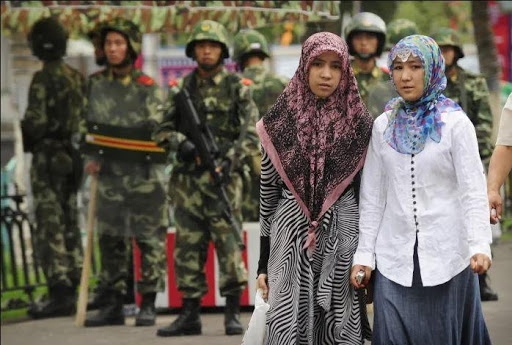With the growing atrocities against the Uyghur Muslim community, China has been under tremendous pressure for the last few months. In retaliation, Beijing has mounted an unprecedented and aggressive campaign to push back, including explicit attacks on women who have made claims of abuse.
Chinese officials have named women, disclosed what they say is private medical data and information on the women's fertility, and accused some of having affairs and one of having a sexually transmitted disease. The officials said the information was evidence of “bad character” invalidating the women's accounts of abuse in Xinjiang reported by the news agency Reuters.
“To rebuke some media’s disgusting acts, we have taken a series of measures,” Xu Guixiang, the deputy head of Xinjiang’s publicity department, told a December news conference that was part of China’s pushback campaign. It includes hours-long briefings, with footage of Xinjiang residents and family members reading monologues.
A Reuters review of dozens of hours of presentations from recent months and hundreds of pages of literature, as well as interviews with experts, shows a meticulous and wide-reaching campaign that hints at China’s fears that it is losing control of the Xinjiang narrative.
"One reason that the Communist Party is so concerned about these testimonies from women is because it undermines their initial premise for what they're doing there, which is anti-terrorism", said James Millward, a professor of Chinese history at Georgetown University and expert in Xinjiang policy.
“One reason that the Communist Party is so concerned about these testimonies from women is because it undermines their initial premise for what they’re doing there, which is anti-terrorism”, said James Millward, a professor of Chinese history at Georgetown University and expert in Xinjiang policy.
Human rights groups are calling it the largest mass incarceration of the 21st century. In the Chinese province of Xinjiang, houses, streets and sometimes entire villages have been emptied of their inhabitants. Accused of religious extremism, they are sent to "re-education through labour camps or “vocational training” centres, as the authorities call them, without any form of trial.
According UN experts, more than one million Uighur citizens, members of a Turkic-speaking, Muslim minority, are held in these camps, which are in reality huge prisons. Detainees are tortured and brainwashed by the Chinese Communist Party.
In the name of "fighting terrorism", attacks blamed on Uyghurs have killed hundreds in recent years, China has turned the whole of Xinjiang province into a gigantic police state. Surveillance cameras are everywhere: at the entrance to schools, supermarkets or even train stations. The police and army patrol the whole territory. Searches and identity checks are systematic. Craftsman, singer, cook, teacher or taxi driver, no one is spared.
Uyghurs who were once detained in internment camps in China’s Xinjiang region say they have been sexually abused and raped during interrogations by Chinese authorities, while also witnessing other fellow detainees being raped.
According to a BBC report last month, a number of former detainees and a guard have come forward to speak about what they experienced and saw within the camps, which China says are to “re-educate” Uighurs and other minorities.
The testimonies detail the traumatic abuse women went through while in the camps, described by Adrian Zenz, a leading expert on China’s policies in Xinjiang, as “some of the most horrendous evidence I have seen since the atrocity began”.
He told the BBC: “This confirms the very worst of what we have heard before. It provides authoritative and detailed evidence of sexual abuse and torture at a level clearly greater than what we had assumed.”
One of the former detainees, Tursunay Ziawudun, said that in her nine months spent in the camps, she was tortured and gang-shaped on three occasions, by two or three men each time.
China immediately banned the media group, stating that the BBC’s reports “violated the requirements that news should be truthful and fair, harmed China’s national interests, and undermined China’s national unity.”
China is facing international criticism over reports of Uyghur genocide. China claims that these camps have benefited millions of workers through educational and vocational training. However, according to testimony from survivors, these so-called education camps are the worst places so far as human rights violations are concerned. Beijing has also rejected calls for an independent U.N. investigation into Xinjiang's internment program. Journalists and diplomats have not been permitted access to the camps outside of tightly controlled government tours. Uighurs in Xinjiang have told Reuters they fear reprisals for speaking to the press while in China.
China's tightly controlled, invitation-only media events on Xinjiang require journalists to submit questions days or weeks in advance. They include pre-recorded videos and prepared testimony by former camp inmates and religious figures.
Beijing has packaged content from the events in two volumes titled, "The Truth About Xinjiang: Exposing the US-Led Lies and Slanders About Xinjiang."
During a regular daily press briefing last week, foreign ministry spokesman Wang Wenbin held up images of witnesses who had described sexual abuse in Xinjiang. The account of one of them, he said, was “lies and rumours” because she had not recounted the experience in previous interviews. He gave medical details about the woman’s fertility.
Xinjiang officials in January said a woman who had spoken to foreign media had syphilis, and they showed images of medical records – unsolicited information that was not directly related to her account, reports Reuters.
A Xinjiang government official said of another witness last month: “Everyone knows about her inferior character. She’s lazy and likes comfort, her private life is chaotic, her neighbours say that she committed adultery while in China.”
Last week, the top spokeswoman for China’s foreign ministry, Hua Chunying, tweeted images of four named witnesses, saying they had “raked their brains for lies”, adding “they will never succeed.”
China has declined to provide data on the number of people in the camps. Beijing initially denied the camps existed but now says they are vocational and education centres and that all the people have “graduated”.




















